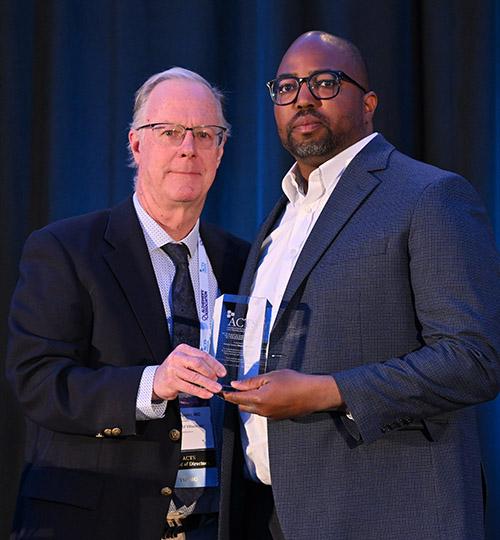
Nwora Lance Okeke, MD, MPH, associate professor of Medicine and Population Health Sciences, is the recipient of the 2025 Association for Clinical and Translational Science (ACTS) Award for Contributing to the Diversity and Inclusiveness of the Translational Workforce.
The award honors individuals who have contributed to a more inclusive, diverse workforce through the career development of their mentees, and to the workforce of their organization. It further recognizes talented investigators who translate their findings from the bench to the beside — and ultimately into the community.
Dr. Okeke is known as a transformative leader in the field of HIV research and clinical practice, dedicated to fostering diversity and inclusiveness within the translational workforce.
His innovative initiatives and unwavering commitment to mentoring underrepresented minorities have significantly advanced the careers of future clinicians and scientists, particularly those from Historically Black Colleges and Universities (HBCUs), award nominators noted, while his passion for developing pathways into clinical and translational science for underrepresented minorities is evident in his work with innovative programs, commitment to mentorship, and leadership in promoting workplace diversity.
“By fostering an inclusive environment and advocating for equitable healthcare practices, Dr. Okeke is not only shaping the future of HIV research but also ensuring that diverse voices are heard and valued in the clinical and translational scientific community,” they wrote.
A Transformative Leader
Motivated by the potential of deploying HBCUs graduates as a critical workforce in addressing the nation’s HIV epidemic, Dr. Okeke saw that the potential impact of making the case to these students about considering careers in HIV aligned with U.S. Department of Health and Human Services goal of ending HIV in the United States by 2050. Over 90% of HBCUs are located in the Southeastern United States, the epicenter of the country’s HIV epidemic, accounting for approximately half of all new infections.
In response, he founded the Duke Center for AIDS Research (CFAR) Evidence2Practice (E2P) initiative, an NIH-funded outreach program to promote careers in HIV patient-oriented research and implementation to HBCU students. E2P is a three-day interactive workshop that introduces HBCU students to the field of implementation science and public health intervention development in the context of HIV and STI prevention. The workshop ends with the development of an action plan for disseminating information on contemporary HIV prevention strategies on campus.
Over the last three years, Dr. Okeke has conducted 28 workshops at 21 HBCUs/minority serving institutions in eight states, engaging with approximately 300 students to date, several of whom have gone on to careers in public health or related disciplines.
Surveys conducted post-workshop indicate that over 90% of participants reported increased interest in pursuing careers in HIV research and public health. Dr. Okeke has also facilitated mentoring relationships between participants and other Duke faculty, and personally provides career mentoring to approximately 20 former E2P participants.
The program has fostered a growing, informal mentoring network among them and with health professionals from multiple institutions in addition to providing academic and professional career path guidance, and enhancing the visibility of HIV science careers within HBCU institutions.
E2P activities have also resulted in new research collaborations with partner HBCUs including a two-year Department of Health and Human Services Ending the HIV Epidemic Administrative Award in conjunction with faculty at the Florida A&M University School of Pharmacy.
This collaboration focuses on using university-based pharmacies to increase access to HIV prevention services, including PrEP, within communities across the South. The program has also been adopted by the Southeastern AIDS Education and Training Center (SE AETC) as its flagship platform for engaging HBCUs towards growing the HIV clinical workforce.